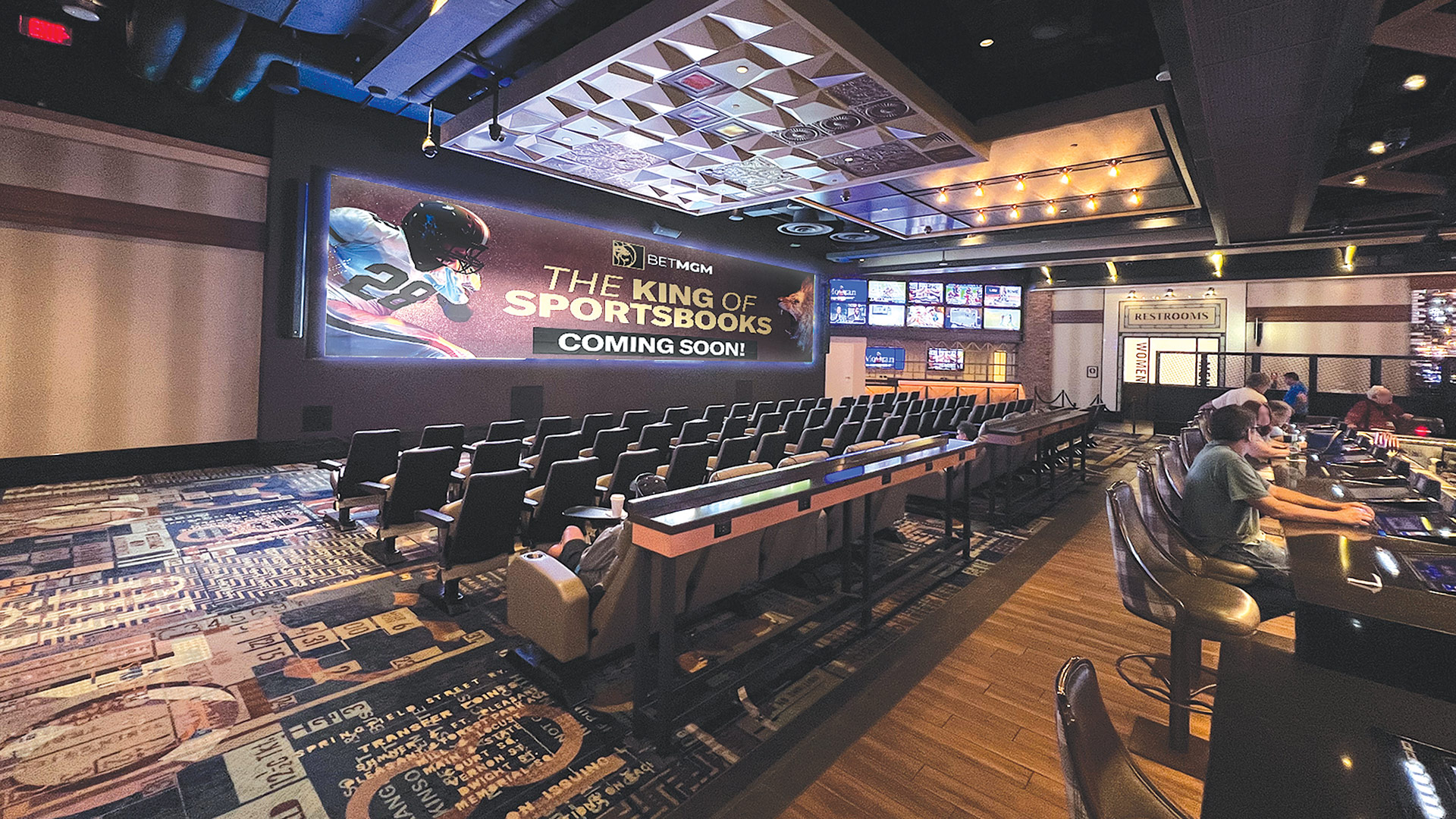At the Goal Line
With 35 other states having done so already, Massachusetts lawmakers were eager to pass a bill this summer legalizing sports betting, and Gov. Charlie Baker followed suit, signing it into law. Now comes the hard work by the Gaming Commission to establish a framework and scores of regulations — and the continuing research into a recreational activity that brings a still-uncertain level of economic benefit, alongside some well-established social risks.

The MGM Sports Lounge was designed to enhance the sports viewing — and eventually gambling — experience.
Rachel Volberg has been researching the effects of gambling for almost four decades, and since 2013, she’s been doing it at the behest of the Massachusetts Gaming Commission (MGC), which selected her team a decade ago to research the potential impacts of casinos.
“We’ve kept a pretty careful eye on things, but only a few U.S. states have any funding in their legislation to conduct research, so we know surprisingly little about the social and economic impacts of betting in the United States as a whole,” she told BusinessWest, and that’s even more true when it comes to legalized sports betting, which Massachusetts recently became the 36th state to legalize.
A research professor in the UMass Amherst School of Public Health and Health Sciences, for the past decade Volberg has been the principal investigator with Social and Economic Impacts of Gambling in Massachusetts (SEIGMA), whose latest report — the first of its kind in the nation — deals with the potential impact of legal sports gambling in the Bay State. And if the picture is still uncertain, it’s coming into focus.
“I think the biggest surprise for us was how little research had actually been done, particularly on the economic impacts — what does the industry look like once you legalize it, once it’s operational? What kinds of jobs, what kinds of revenues, and how are those jobs translating into economic benefits? There were literally only two or three economic studies we were able to identify, so there’s clearly a lot of work to be done in that area.”
What is emerging may not thrill proponents of sports gambling who support legalization on economic grounds. The study contends that direct economic impacts will depend on shifting spending from the illegal to legal market, and the impacts will not be entirely new since the majority of these already occur due to the illegal market. In addition, sports betting will primarily redistribute money already in the economy rather than attracting new money from outside Massachusetts.
“Sports betting is, by far, the number-one question I get asked on a daily basis, and it has been for years now. The entire team is looking forward to welcoming the first bet. When the time comes, we’ll be ready.”
“When you compare the tax revenue we anticipate being generated in Massachusetts by sports betting, the optimistic scenario is $60 million a year,” Volberg said, “which is not very large compared to the lottery, which in 2019 generated $1.1 billion in tax revenue, or casinos, which in 2019 generated about $168 million.”
That’s not nothing, of course, and state lawmakers overwhelmingly supported the bill to bring sports gambling out into the open, as did Gov. Charlie Baker, who signed the bill into law shortly after. It was the culmination of momentum that had been building since sports betting was legalized by a U.S. Supreme Court decision in 2018. Area legislators pointed out that, with every state in the Northeast having followed suit, Massachusetts was losing money to its neighbors.
“Legalizing sports wagering in Massachusetts will allow us to finally compete with neighboring states and will bring in new revenue and immense economic benefits,” state Sen. John Velis said in August.
The bill allows for 15 online licenses for companies like DraftKings and FanDuel, in addition to five retail licenses for the three casinos and two racetracks in Massachusetts. The bill also creates a commission to study additional licenses for smaller businesses, such as bars and restaurants.
The bill includes out-of-state collegiate betting but does not allow bets on Massachusetts college teams unless they are in the playoffs. The bill also includes a 20% tax on mobile bets and a 15% tax on retail bets, which would be paid by the operating company.
Rachel Volberg
“At this point, the most optimistic scenario for sports betting tax revenues in Massachusetts is about $60 million, and that’s assuming the legal operators are able to capture the great majority of the legal market. It also assumes it will attract people who haven’t bet on sports before there was a legitimate, legal provider.”
“Sports betting is, by far, the number-one question I get asked on a daily basis, and it has been for years now,” said Chris Kelley, president and chief operating officer of MGM Springfield, which built two sports viewing lounges last year partly in anticipation of legal sports betting (more on those later). “The entire team is looking forward to welcoming the first bet. When the time comes, we’ll be ready.”
Devil’s in the Details
With the legislation now law, the MGC will work out the details that will make legal sports betting a reality. It has already come up with a list of about 225 regulations that will need to be drafted.
“A great deal of work has already been done by our team in anticipation of sports wagering becoming legal in Massachusetts,” Gaming Commission Executive Director Karen Wells said last month. “This includes identifying over 200 potential regulations, adopting a framework to utilize industry-recognized technical standards, establishing an infrastructure to investigate and license applicants, initiating the hiring of a chief of Sports Wagering, and scheduling public meetings. Now that we have a law that defines our responsibilities as regulator, we will work with our stakeholders to swiftly stand up this new industry with a focus on integrity, player safety, and consumer protection.”
They’ll take a hard look at SEIGMA’s report in crafting that framework and its many elements, Gaming Commission Chair Cathy Judd-Stein said, noting that “this report will aid the MGC as we begin to regulate a sports-wagering industry in the Commonwealth with an uncompromising focus on integrity and player safety.”
Volberg added that “we were trying to give a very broad overview of what is known at this point about the social and economic impact of sports betting, and it’s the first nationwide effort to do that. It also summarizes what we know about sports betting in Massachusetts.”
She told BusinessWest that the ‘handle’ — a term that refers to all money bet, including rewagered winnings, creating a high level of churn — is not the same as the total revenue taken in by operators.
“It’s easy to lose sight of the fact that sports betting is run on very narrow margins, so the actual revenues the operator is able to generate are a very small number of what the handle numbers are,” she explained. “At this point, the most optimistic scenario for sports betting tax revenues in Massachusetts is about $60 million, and that’s assuming the legal operators are able to capture the great majority of the legal market. It also assumes it will attract people who haven’t bet on sports before there was a legitimate, legal provider.”
Because so little information about the impacts of sports betting is available, Volberg’s team mined data from their own surveys and studies that are part of the research ordered by the Massachusetts Legislature when lawmakers passed the Expanded Gaming Act in 2011. Meanwhile, a representative survey of 8,000 adults was completed in Massachusetts earlier this year and provides a snapshot of changes in gambling behavior, attitude, and problem-gambling prevalence since 2013-14.
“The National Council on Problem Gambling has seen a significant increase in sports-betting participation since 2018,” she told BusinessWest, noting that it has also reported an increase in people saying they had experiences with one or more impacts or harms.
“That suggests that an increase in sports betting has the potential to come with increased harm, which is not a surprise, but in Massachusetts, because the Gaming Commission already has familiarity with implementing measures to try to minimize and mitigate harm — because they already have that experience with casinos — we’re hopeful those harms can in fact be minimized,” Volberg added.
Cathy Judd-Stein
“This report will aid the MGC as we begin to regulate a sports-wagering industry in the Commonwealth with an uncompromising focus on integrity and player safety.”
Alisha Khoury-Boucher, a clinical supervisor at MiraVista Behavioral Health Center, agreed to an extent. “Gambling has been a concern for a long time, but we already have a casino close by, so we don’t see a major change with the people we serve from legalizing sports gambling; if they wanted to do those things, they were already doing those things. It’s the behavior more than the access.”
Still, she added, “in my opinion, where we may see more of a problem is with young people, college-age people, who may still be home with mom and dad and have more disposable income. We might see an increase there, but that’s to be determined.”
“Any time a new entertainment is starting up, it’s always going to be advertised toward young people,” Khoury-Boucher said, citing vaping as one example. “They weren’t looking for middle-aged people who’d been smoking for 25 years; they were looking at mid- to late adolescents. It’s kind of the same thing with sports gambling. If you’re a sports fan, you’re seeing advertising that looks like the old beer commercials — everyone’s happy, it’s exciting, it’s flashy. They’re targeting young people, and that’s potentially a problem.”
Indeed, SEIGMA’s study notes that sports betting occurs in all demographic groups but appeals most to young, well-educated men. It adds that problem gambling is higher among sports bettors primarily because they tend to be involved with a large number of other gambling activities, so legalizing sports betting in Massachusetts has the potential to increase rates of gambling harm and problem gambling.
To mitigate those concerns, SEIGMA is advising the Gaming Commission to require operators to provide player data to the MGC on a regular basis and to cooperate with researchers; to prohibit live, in-game sports betting, which is disproportionately utilized by problem gamblers; and to restrict advertising and celebrity endorsements, which tend to promote sports betting in young people, precipitate relapse in recovered gamblers, and counteract the effectiveness of messages advocating limited, lower-risk involvement.
Volberg noted that only four states have funded any kind of research about sports betting, while 12 have provided funding for problem-gambling services. This contrasts with Massachusetts, where 9% of the tax revenue raised from sports betting will go into the Public Health Trust Fund that supports research and services to mitigate gambling-related harms.
“We are in a unique position in Massachusetts to be able to monitor the impacts of sports betting as it becomes legal and make adjustments to its provision so as to maximize the benefits and minimize the harms.”
Sit Back and Watch
Those benefits, as noted, are uncertain, but operators are excited about the prospects.
For maximum economic impact, SEIGMA’s report recommends issuing licenses for online operators, and a variety of them, since most sports betting is done online. That lines up with the Gaming Commission’s plans.
“While it is likely that sports-book operators, including land-based and online operators, will benefit from sports-betting legalization in Massachusetts,” the study notes, “it is difficult to predict whether sports bettors will add legal sports betting to their repertoire or simply substitute betting on sports for spending on other types of gambling.”
Still, as the leader of the only casino in Western Mass., Kelley sees potential benefits not just for his facility, but for the region itself.
“Massachusetts residents are already driving across the border to Connecticut, Rhode Island, New Hampshire, and New York to place bets. Keeping the millions of tax dollars generated annually by sports wagering in the Commonwealth is a big deal,” he told BusinessWest. In addition, “sports betting at MGM Springfield will bring more foot traffic and visitors to downtown Springfield. We are thrilled at the prospect of not only having more people come and enjoy our property, but to experience all of the amazing businesses nearby.”
To enhance the viewing and gambling experience, the MGM Sports Lounge opened in August 2021, featuring more than 70 lounge seats and a 45-foot state-of-the-art HD viewing wall, inviting fans to watch multiple sporting events at once. A new VIP Sports Lounge also opened last August within TAP Sports Bar, offering a more intimate experience, including a state-of-the-art HD viewing wall.
“As a New England sports fan, I can tell you the MGM Springfield Sports Lounge is the best spot to watch the Patriots, the Red Sox, the Celtics, the Bruins, you name it,” Kelley said. “It’s also just a great place to gather with your friends for a fun night out. As soon as we get the green light, we are ready to incorporate the BetMGM platform into our property.”
Yes, the green light — it’s what many in the gaming industry in Massachusetts have been anticipating for a long time, hoping the benefits of legal sports betting exceed early projections — and outweigh the potential harms.
Joseph Bednar can be reached at [email protected]








